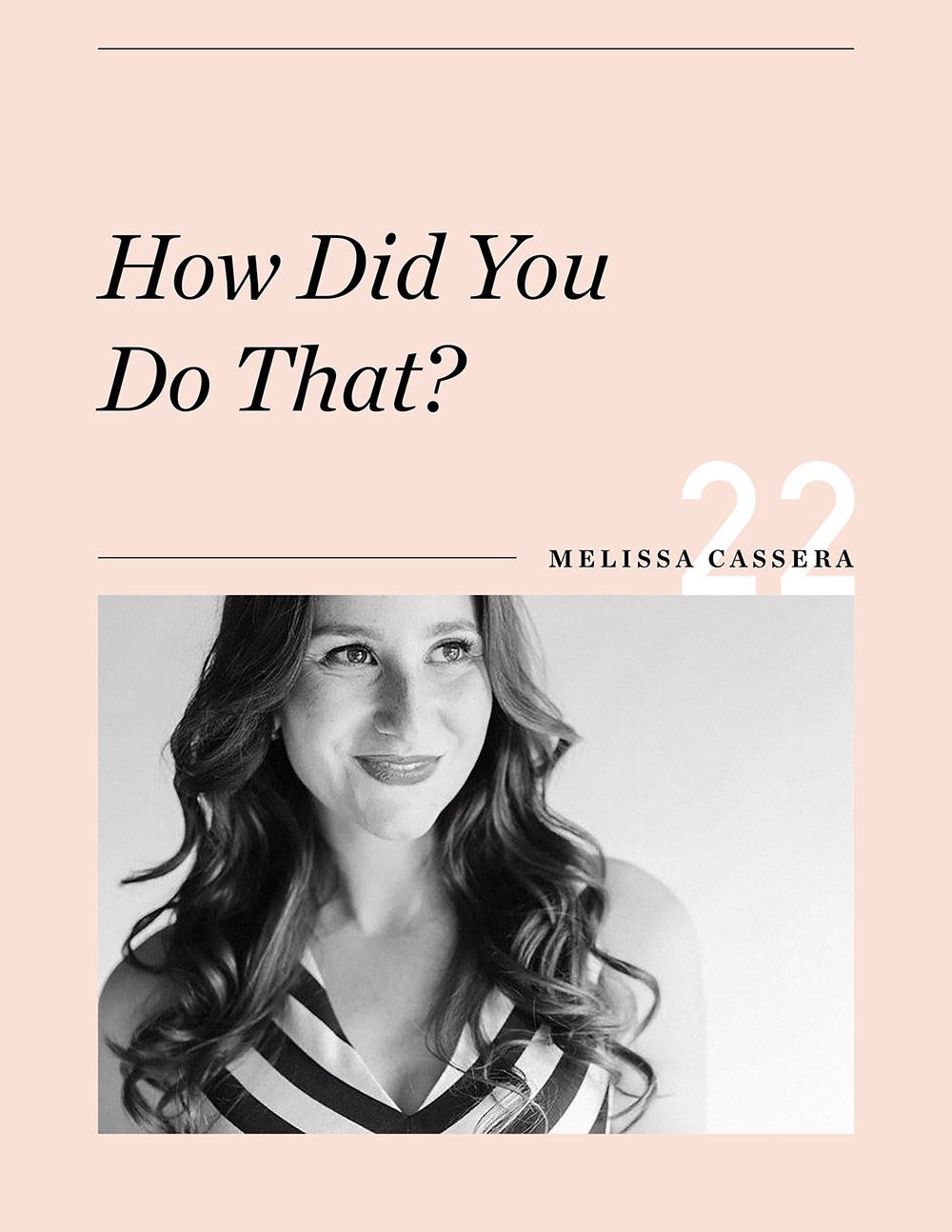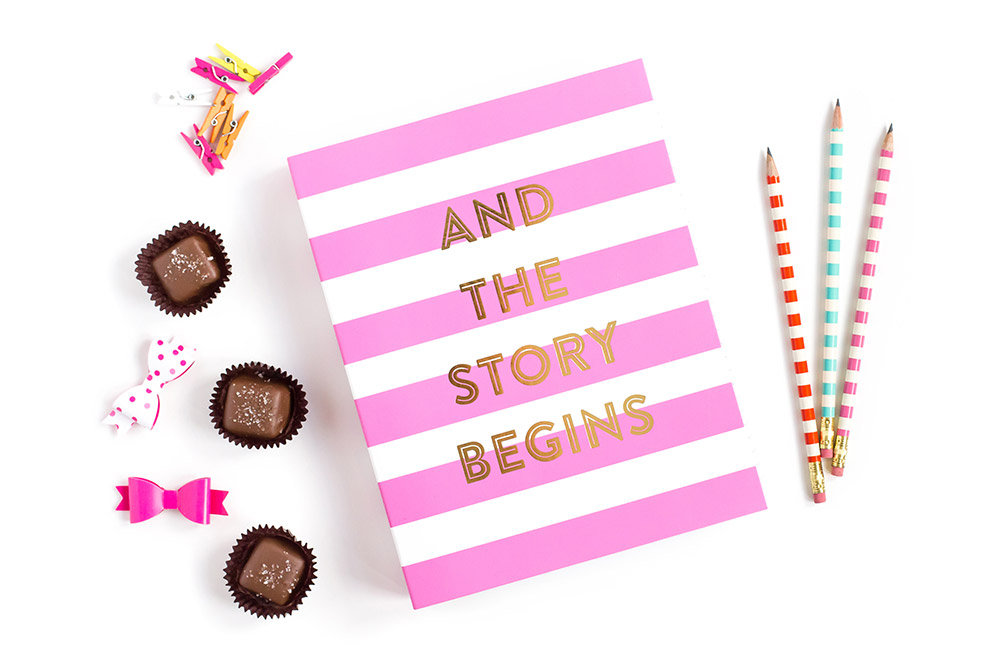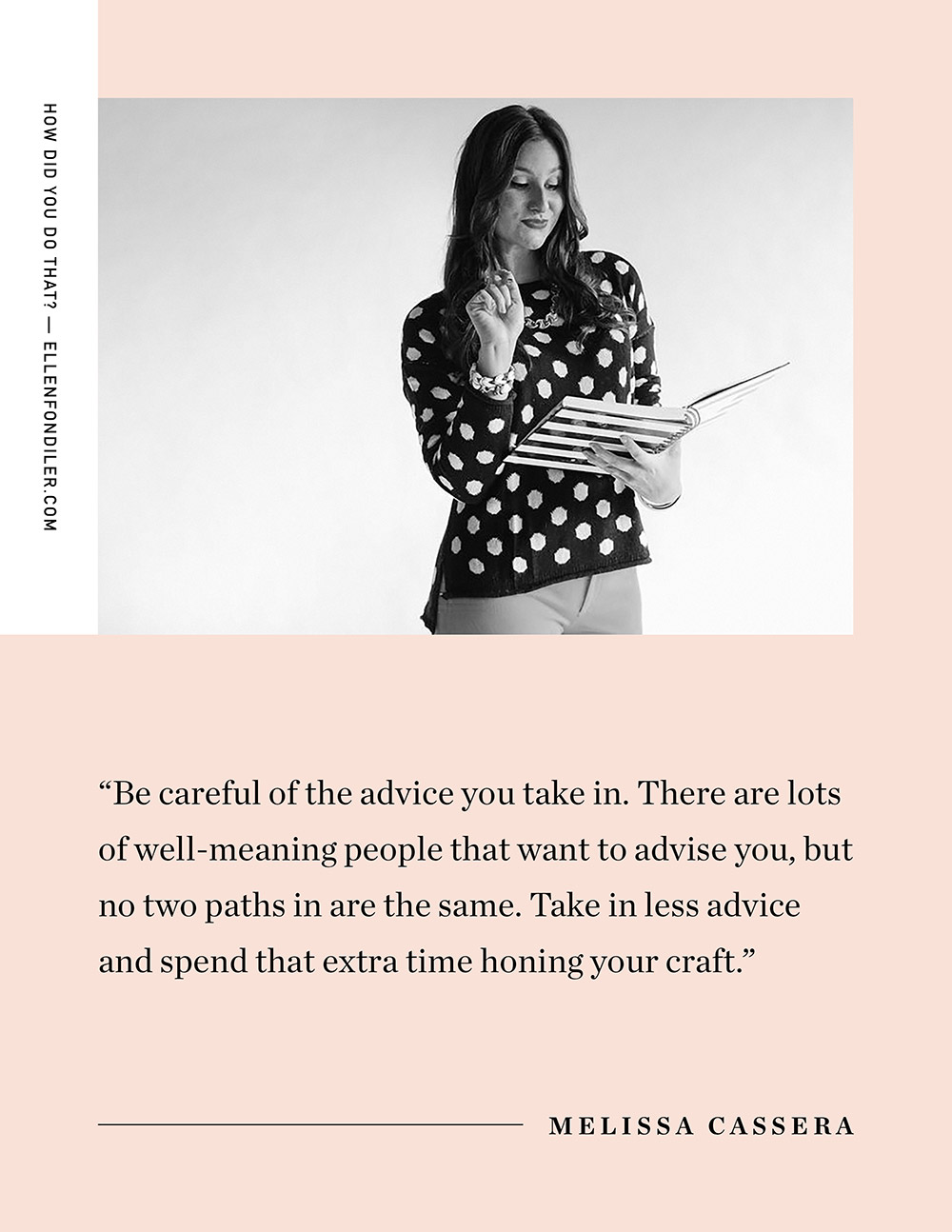
Whenever I meet someone who’s got a really cool job, who runs a thriving business, or who has completed an amazing project, I always want to know: “How did you do that?”
I’m always curious to hear the “behind-the-scenes story” — who they emailed, what they said, how they got their first client, how they got their foot in the door — the exact steps that they took to achieve their goal.
HOW DID YOU DO THAT? is an interview series where we get to hear the REAL story behind someone’s success—not the polished, neat and tidy version.
To see a complete list of all the interviews that have been completed to date, head over here.

Name: Melissa Cassera
Location: Los Angeles, California
Profession: Business Strategist and Screenwriter
Melissa, you’ve gone through many chapters in your career. In your twenties, you did some acting work for TV commercials and independent films. Then you worked in advertising, marketing, and sales. Then you started your own PR and marketing agency. And today, you’ve come full circle, and you’re back in the TV industry working as a screenwriter. Whoa! It’s quite a journey! I am curious to know… what’s one of the biggest “high points” in your career so far, and what’s one of the lowest “low points”?
One of the biggest high points was seeing my name on screen as a writer for the first time! When my Lifetime Movie Girl Followed premiered earlier this year, all of my family, friends, clients, etc. took photos of their TV screen and texted them to me. It was the BEST feeling! Especially because so many people told me that it would be impossible to begin a screenwriting career in my late 30s, or they said it would take between 7 and 10 years to even sell anything, much less get it made. One of my lowest low points was very early on in my business, I took on a marketing client that my gut was screaming not to. Lesson learned. I ended up getting sued, even though I wasn’t at fault for anything, and I learned anyone can sue you if they have enough money and bizarre personal vendettas. I guess everything does come full circle because that situation was like a Lifetime Movie!
Have you always loved writing? What are some of the earliest writing projects you can remember doing–as a kid, or as a teenager?
In elementary school, I was a big fan of soap operas (General Hospital!) and I used to pen these salacious, soap opera-type tales about my classmates. They were pretty naughty for a 5th grade audience (oops!), and eventually a teacher caught me and terrified me enough that I didn’t write fiction again until my mid 30s when I began screenwriting!
I do have a business writing background, and cut my teeth as a publicist and copywriter for years – landing clients on Oprah, The Today Show, etc. I also worked with several ad agencies developing campaigns and writing copy for brands of all sizes. Eventually I moved that experience into consulting and teaching entrepreneurs how to craft their own stories, message & copy.

I’ve heard lots of horror-stories about how it’s so difficult to “make it” in Hollywood. Stories about people getting crappy internships for no money, trying to rise up through the ranks, toiling away for decades before ever getting noticed or getting their “big break.” Is this depiction of the TV industry accurate? Has that been your experience? Or not?
Oh goodness. One of the first pieces of advice I got in LA was: “if you want to be a screenwriter, you have to be an assistant first – for many years. And your biggest responsibility is making sure the cold sodas are moved to the front of the refrigerator so the writers don’t get the warm sodas.”
Warm sodas = death of creativity, I guess?
The answer to your question is: yes and no.
It really depends on your definition of “making it.”
Here’s an example:
Many writers have a very specific goal of getting staffed on an existing TV show.
This is attractive because it’s really the only “guaranteed” paycheck for a writer. If you are “staffed” that means you can expect to have a job for at least one season (often more if the show is picked up for another season.) That means you get paid well to be in the room pitching ideas, you may get to write an episode (or 2) and you hope to move up the ladder to become a Story Editor, Producer, etc. This is a very typical path and the one that’s most common for people to pursue.
It is very difficult to get staffed. The most common paths in are to work your way up from an assistant (sometimes for several years) before getting a shot a staffing job. You could also luck into a network diversity fellowship, which most of the major networks host and accept a handful of people each year (though there’s no guarantee you’ll get a job after your fellowship). Tens of thousands of people enter those fellowships and they are a TON of work to enter, so it can really feel like a very tough uphill battle.
While I’m not opposed to staffing, and would give my left arm to work for Shonda Rhimes or Alan Ball, it’s not my goal. My initial screenwriting goals were 1) to write a Lifetime movie (accomplished!) and 2) sell my TV pilot (accomplished!) and 3) Get representation (I have an awesome literary manager!) I’m now writing what I want to write (dark, independent drama films) and shadowing directors, producers and casting directors to see if there are other areas of the business I’d like to pursue.
Another goal I have is to be known as the “punch up” writer for strong, layered female characters – meaning I’m hired by studios to go over an existing script and make suggestions of how the women characters can be stronger/more diverse.
I love writing my own scripts, but I’m equally excited to collaborate with others on existing ideas/scripts and make them the best they can be!

One of your TV writing mentors once said to you, “Good work always gets found.” Tell us more about this statement. What does it mean to you?
I was so lucky to get this advice early on from a working TV Show Creator/Showrunner. It took so much pressure off of me to follow all the other advice out there (like cold sodas) and really focus on my craft.
I learned to focus on my writing and tune out the noise and “advice.” If you have a great script, EVERYONE will want to read it.
You can network, schmooze, grind away as an assistant, etc. – but if you don’t have a good script, none of that matters.
My mentor told me to read tons of scripts. Watch TV and movies. Write. Write some more. Hire a story consultant. Create a “circle of trust” – people in the industry that can read your script and give you amazing notes to move your story forward. So, that’s what I did!
What’s your favorite thing to do when you’re having a stressful or discouraging day? What helps to shift your mood?
I love downloading soundtracks or trailer music and going for a long walk. Epic beats almost instantly put me in a better mood! Plus, I start to fantasize about new characters and storylines, so win-win!
Your first movie, Girl Followed, recently premiered on the Lifetime Network. You sold a TV show called Addicted to a production company. And I’ve heard rumors that you’re pitching some movie projects, too. What’s next for you? What can we expect to see from you in 2018, 2019, and beyond? I know that you might be bound by some confidentiality agreements, but is there anything you’re able to share?
Yes! I have a second movie in post-production for Lifetime (can’t say the name, unfortunately) ADDICTED (my TV show) is in development currently with a studio, which means we are writing all of the first season’s episodes. It’s a really exciting process! My manager is currently shopping around another feature (movie) script – it’s a dark & sexy psychological thriller!
In 2018, I’d love to sell another feature film script and really amp up my industry connections. I’m aiming to make 100 new connections in 2018!

3 THINGS
Can you share 3 pieces of advice for someone who wants to pursue an unusual (or, some might even say, “unrealistic”) career, like becoming a screenwriter?
1. Be careful of the advice you take in.
There are lots of well-meaning people that want to advise you, but no two paths in are the same. Take in less advice and spend that extra time honing your craft.
2. Find a few mentors, and adjust your expectations for them.
A mentor doesn’t necessarily mean that they are always there at the drop of a hat and will look over your work and give advice constantly. Remember that these folks are BUSY and you want to respect their time. I have a few different mentors, and I probably only see them a few times a year, but their help is so powerful and I completely respect their time and their own projects and dreams.
3. Look for inspiration outside of the career path, or come at your work from a fresh perspective.
For example, most writers are in writing classes or writing groups (which can be amazing and valuable). But, I once had a top literary agent tell me that he requires all of his clients take improv classes so they are better in pitch meetings. I thought that was so smart, and of course enrolled immediately at UCB (and yes, it DID help me in pitch meetings!) I also just finished up a class that was about “directing for actors.” Do I want to be an actor or a director? Not necessarily. But, it was so helpful getting to see things from their perspectives and my writing improved because of it.
ONE MORE THING…
Do you have “one more quick question” that you’d like to ask Melissa? Email me and tell me what you want to know! I might choose your question for my ONE MORE THING… Podcast (Coming soon!!!)
YOUR #1 CAREER GOAL: ACHIEVED
Do you need some encouragement to help you achieve a big, daunting career goal? Would you like to have a career coach/strategist in your corner—feeding you ideas that you’d never considered before, helping you figure out who to contact, and what to say, and checking in to make sure you don’t procrastinate? If so… click here to find out how we can work together. I’d love to coach you!
![]()
